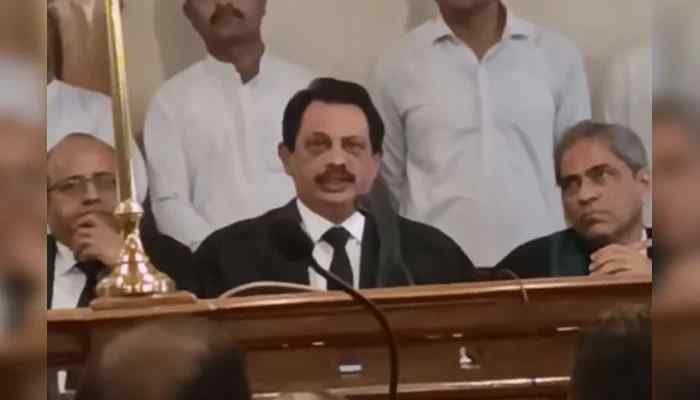Umerkot — Supreme Court Justice Salahuddin Panhwar delivered a blistering critique of Pakistan’s judicial machinery on Friday, accusing corrupt judges, lawyers, and police officers of turning the courts into instruments of injustice. Speaking at the oath-taking ceremony of the Umerkot Bar Association, he warned that the system is collapsing under the weight of dishonesty and political influence.
“Justice delayed is justice denied,” Panhwar reminded his audience, citing shocking examples: an inheritance dispute unresolved for 71 years, and a road accident case that took 24 years to conclude. “If a court cannot deliver justice, it serves no purpose,” he said.
Corruption Shielding the Powerful
Justice Panhwar accused some judges of bending to the will of feudal lords and bureaucrats rather than upholding their oath. He pointed to the murder case of journalist Nasrullah Gadani, where, he claimed, lawyers from three bar associations, sections of the police, and even certain judges sided with the accused.
He also condemned the misuse of laws intended to protect the poor — particularly the Dispossession Act — saying they are now tools for harassment. The Sindh Building Control Authority, he added, has seen judicial decisions that cost lives. “Whose judges are we — the people’s or the elite’s?” he asked.
‘Sometimes I Wonder if We Are Judges or Bandits’
In unusually candid remarks, Justice Panhwar reflected on hypocrisy in society, noting that people project virtue while acting otherwise. He urged judges to step out of their offices and engage directly with communities.
Touching on social issues, he challenged the narrative on forced religious conversions, saying most girls who run away from home are from Muslim families. This, he argued, reveals a deeper societal failure to protect women, particularly in marginalised groups such as scheduled castes. Many, he said, are denied education, inheritance rights, and shelter.
A System Running on Formalities
Panhwar criticised “speedy” case disposals that serve as statistics rather than justice, citing Mirpurkhas courts’ disposal of 319 out of 320 cases in just one week. “This is not justice, it’s a formality,” he said, questioning how police can be expected to perform in such an environment.
He described upper Sindh as plagued by “dacoit culture” and lower Sindh, including Umerkot, by a “drug epidemic,” both of which have paralysed law enforcement. In one case, he recalled, a senior police officer admitted he could not control crime. “If we can’t act, we should resign and go home,” Panhwar told him.
Warning of a Collapse
The judge also criticised the misuse of the Cooperative Housing Society Act, saying it was designed to support farmers and workers through collective forums and loans, not to create housing schemes for profit.
“Our rulers lie, our institutions lie, and now the people have stopped telling the truth,” he warned in closing. “If we don’t change ourselves, the system will collapse.”
The ceremony was attended by Justice Jan Ali Junejo of the Sindh High Court, Tharparkar Sessions Judge Abdul Waheed Sheikh, Umerkot Sessions Judge Abdul Qudoos Memon, and several senior bar council members.
